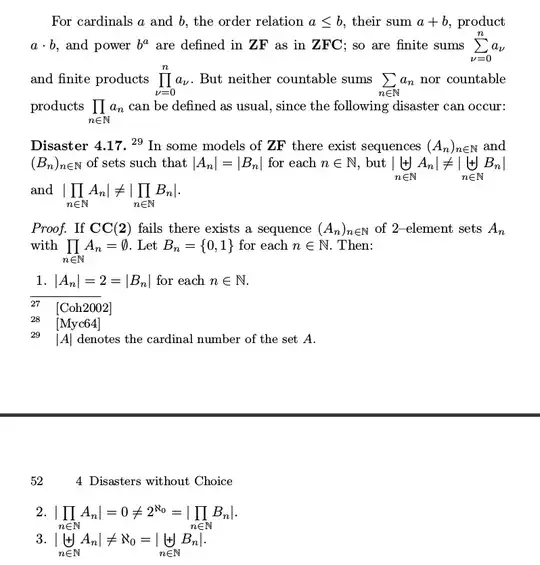I am self-studying Horst Herrlich, Axiom of Choice (Lecture Notes in Mathematics, Vol. 1876), and I'm getting quite confused about cardinal arithmetic without AC.
Here (Which sets are well-orderable without Axiom of Choice?) OP writes that $\mathbb R$ is not necessarily well-orderable in ZF. At the same time, it seems to me that $\mathcal P(\omega)$ is well-orderable in ZF (attempt of proof follows). Therefore, either my proof is wrong, either the answer to the original question is "Yes". Any help? Thanks.
Claim ZF $\vdash$ "$\mathcal P(\omega)$ is well-orderable"
Proof We know that $2=\{0,1\}$ is a cardinal number, therefore it is well-ordered w.r.t. "$\in$" (of course this could be manually checked too). Same holds for $\omega$. (I'll use "$<$" instead of "$\in$"). Let's consider $2^\omega = \{f \mid f : \omega \to 2\}$. The relation defined by $$f \prec g \iff \exists n \, [f(n) < g(n) \wedge \forall i\!\!<\!\!n \;\; f(i)=g(i)]$$ is a well-order on $2^\omega$ (and this is true in ZF). To conclude, just observe that ZF $\vdash 2^\omega \approx \mathcal P(\omega)$.
Update: The proof is wrong, since the lexicographic order on $2^\omega$ is clearly not a well-order, as pointed out in Asaf Karagila's answer. Asaf claims also that ZF $\not\vdash$ "$2^\omega$ is well-orderable". But then, I have another question: in the book I cite above, there is the following proof (page 51):

Now: If $2^\omega$ is not necessarily well-orderable, why is the author allowed to use $2^{\aleph_0}$ as a cardinal number? Or, equally, why is he allowed to talk about the cardinality of $\prod_{n \in \mathbb N} B_n$?
Solution to update: It was just a matter of definitions. In the text I've studied these topics, cardinal numbers are defined as ordinals for which there is no bijection with smaller ordinals. Then, given a set $A$, $|A|$ is a cardinal number, therefore it is defined iff $A$ is well-orderable. On the contrary, in this book $|A|$ is intended as the equivalence class of $A$ under the equivalence relation $A \sim B \iff $ there exist a bijection $A \to B$. This way, $|A|$ is always well-defined.